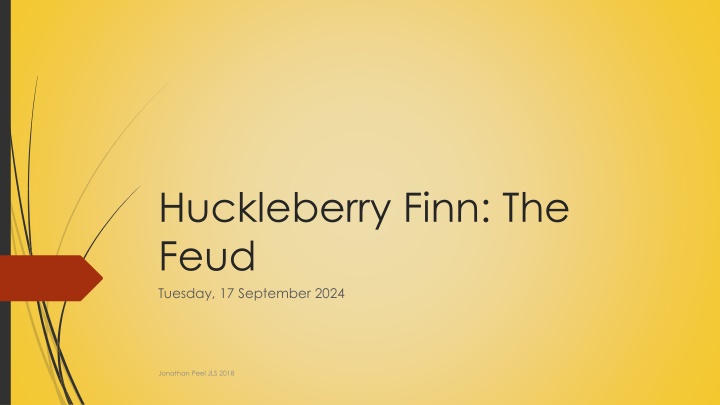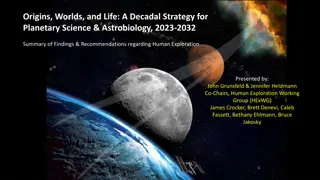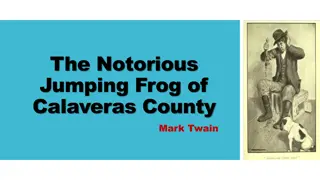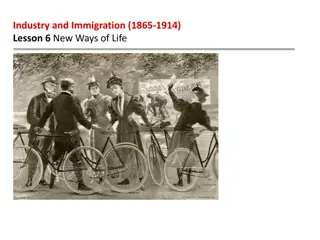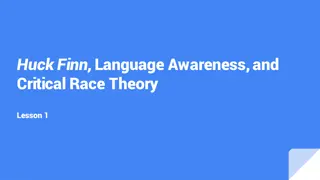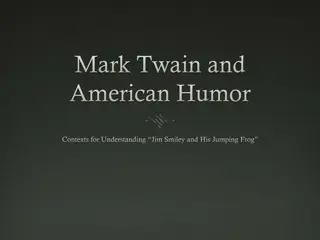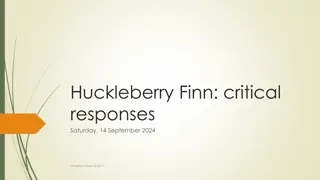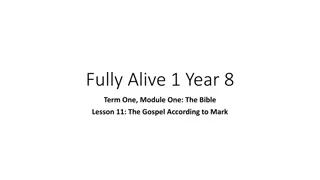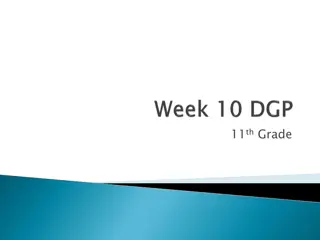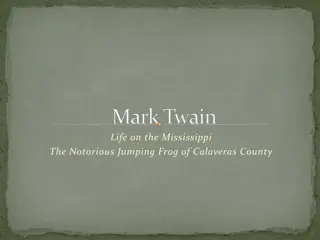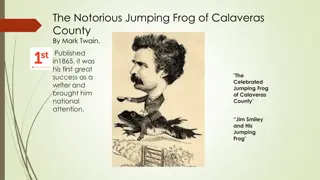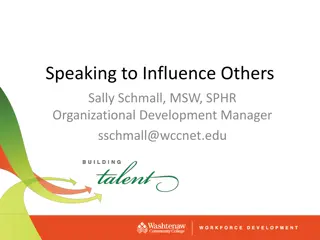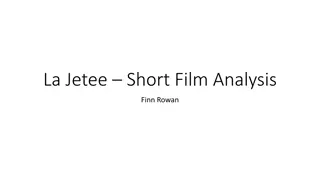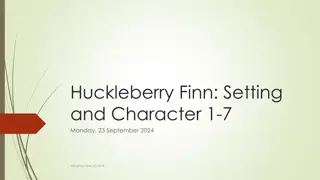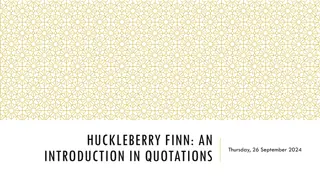Exploration of Themes in Mark Twain's "Huckleberry Finn
Mark Twain's "Huckleberry Finn" explores conflicts between individual freedom and societal norms through vivid depictions of rustic chivalry, family feuds, and societal influences. The novel delves into themes of morality, tradition, and social structure as seen through the eyes of the protagonist, Huck. Twain's narrative intertwines elements of freedom and constraint, painting a complex picture of life on the Mississippi River during a period of societal upheaval.
Download Presentation

Please find below an Image/Link to download the presentation.
The content on the website is provided AS IS for your information and personal use only. It may not be sold, licensed, or shared on other websites without obtaining consent from the author.If you encounter any issues during the download, it is possible that the publisher has removed the file from their server.
You are allowed to download the files provided on this website for personal or commercial use, subject to the condition that they are used lawfully. All files are the property of their respective owners.
The content on the website is provided AS IS for your information and personal use only. It may not be sold, licensed, or shared on other websites without obtaining consent from the author.
E N D
Presentation Transcript
Huckleberry Finn: The Feud Tuesday, 17 September 2024 Jonathan Peel JLS 2018
A new beginning Twain returned to writing in 1879-80 and revisited the river in 1882 on a tour. He returns to the novel with a purpose: to present the conflict between the independent freedom of the individual and the civilised societal norms being imposed on his beloved river. This seen in the raft vs society: The raft is free and easy and comfortable where society is cramped up and smothery Twain went further describing the South as caught up in the world of novelists like Walter Scott: in love with dreams and phantoms decayed and swinish forms of religion decayed and degraded systems of government with sham grandeurs sham chivalries.. Of a brainless and worthless long-vanished society. In the middle section he explores this degenerate and decaying world.
Grangerfords and Shepherdsons At opening, Huck is introduced to a world of threat, violence and danger. The door has to be opened by unlocking, unbarring and unbolting a world far removed from the open easiness seen hitherto. The atmosphere is threatening 3 big men with guns, the door hurriedly rebolted and Huck searched for arms. The right to bear arms instituted in 1791, 40 years prior to setting of the story! Buck is introduced: Huck s mirror image sleepy, humorous and blood thirsty his upbringing is not questioned. Each member of the family has a slave (nigger). Huck does not question this.
Sham Chivalry The rustic chivalry of the area (Cavalleria Rusticana ) is seen to be based on old grudges and forgotten slights. Buck in 17 is clear: Did you want to kill him, Buck? Well I bet I did . What did he do to you? He never done nothing to me . What did you want to kill him for? On account of the feud. Huck does not understand the idea of a feud. The futility of such mindless tradition is lost on him, and on the reader. Buck has no idea of the origins of the feud, yet carries it on regardless. He is angered at the idea that a Sheperdson might be a coward Huck perceives the actions of the old man in shooting an unarmed boy as cowardice since this reduces the whole feud. It is required that the opponents are seen as brave and worthy adversaries. It is not cowardice: the shot is in the open and the child should have known better than to be unarmed. Cowardice is shooting from a hiding place. The tit for tat killing is a sign of chivalry
The home Locked and secure. Plentiful food and a good standard of living Slaves All seem relaxed and comfortable smoking and quilts Huck likens the house to a town house as a measure of high praise. We can see the civilised notions of society tainting the rural ideal. Nature is shut out and replaced by a loud clock which entrances Huck and by reproduction parrots and dogs, and (damaged) fruit. Civilised. Books are improving and marks of civilisation religion and political speeches, alongside poetry. Art is hearking back to the declaration of Independence and formation of the country.
Emmeline Grangerford Dead at 15. Haunts the home in her crayons and poetry. All focus on death. Black is predominant colour Mawkish sentiments of death mirroring the outlook of the family in terms of the feud. Huck does not like this art - he does not self-indulgently dwell in depression. The ending of each title: Alas develops a splendid irony Twain poking satirical fun at a family who cherish this child and her dark images, but who have caused her deathly obsession in the first place. Her poetry is similarly satirical funeral dirges. Note her running to beat the undertaker to corpses ambulance chasing of a literary bent. BUT she warn t particular, she could write about anything you give her to write about no emotional understanding of the subject.
Huck has mixed feelings Knows the feud is futile Uneasy around the guns and killing Finds the house wonderful and comfortable The men are tall beautiful men Col Grangerford is well born the description is clear on height and bearing, yet is cold and cruel thinnest lips blackest kind of eyes (note the superlatives) He was kind yet when the lightening begun to flicker out from under his eyebrows he is a terrifying man. Focus on well bred living and religious observance is at odds with merciless killing described in the feud.
Power of language Emmeline s poetry debases the language of mourning and turns it into the mawkish outpourings of a teenager. At church, the sermon is on brotherly love. A clearer example of religion and society being out of touch is hard to find. Church is used by Sophia to plan the elopement. Huck is made her go- between.
Reunited Only the slaves seem ot have a sense of shared responsibility Note, Huck is not beyond casual bigotry: my nigger is the language of the slave owner. Jim and Huck are reunited Twain has more to tell and does not wish to become becalmed here. Jim has saved the raft and re-equipped her for the journey to continue south. Jim leads the conversation. It is clear the blacks work together and show respect for each other in a manner unknown to the well born white families.
Death Huck oversleeps and misses the beginning of the fateful day. Sophia has eloped with Harney Shepherdson a Romeo and Juliet variation The death of Buck begins lightly men are cavorting on their horses yet ends with a brutality and blood lust which makes Huck sick . He can barely tell his story. He blames himself for the incident. He finds the boys and shows Buck some respect for he was mighty good to me It is not clear what he has done beyond showing friendship, but Huck has met and lost a companion of his own age and temperament in this action. The pair leave, after some confusion, and after two mile feel able to settle into raft life again, leaving the hypocrisy of the we;; bred civilised world behind them. youfeel mighty free and easy and comfortable on a raft.
